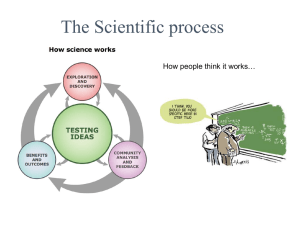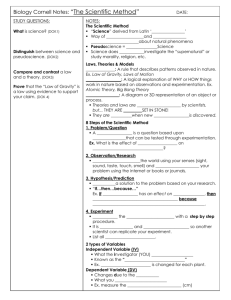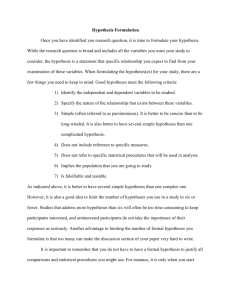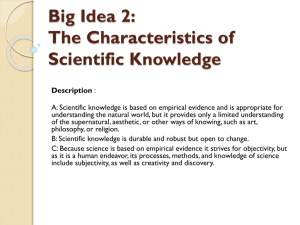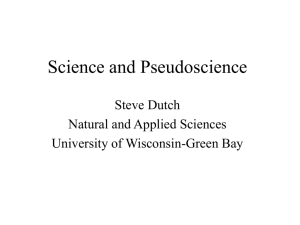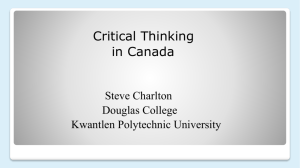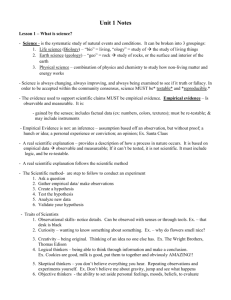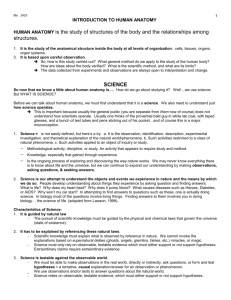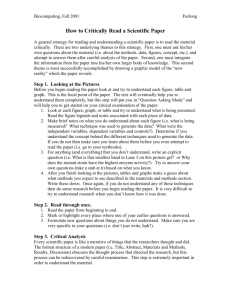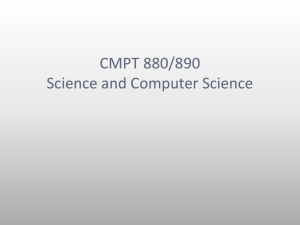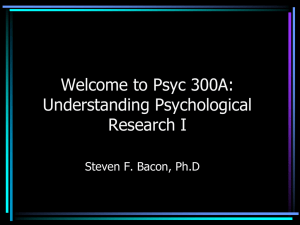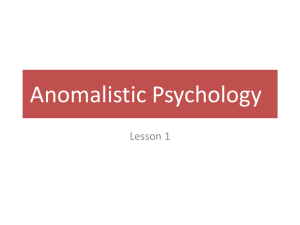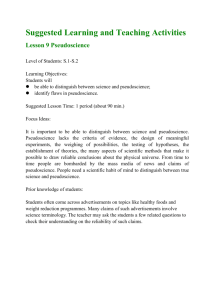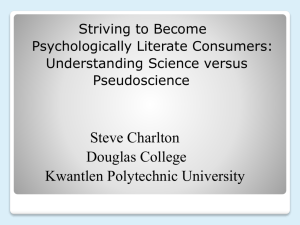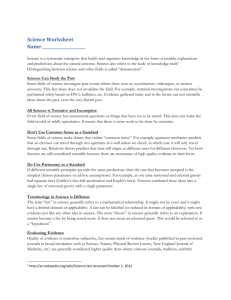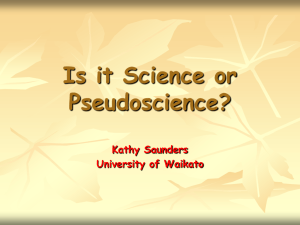ANOMALISTIC PSYCHOLOGY Introduction
advertisement
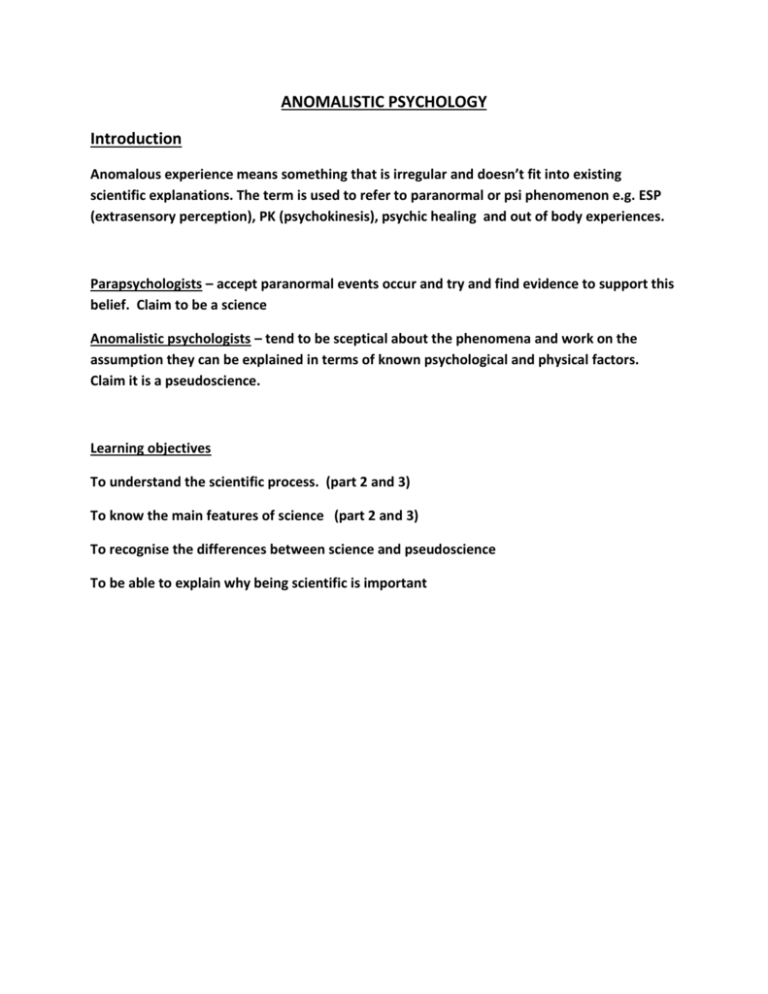
ANOMALISTIC PSYCHOLOGY Introduction Anomalous experience means something that is irregular and doesn’t fit into existing scientific explanations. The term is used to refer to paranormal or psi phenomenon e.g. ESP (extrasensory perception), PK (psychokinesis), psychic healing and out of body experiences. Parapsychologists – accept paranormal events occur and try and find evidence to support this belief. Claim to be a science Anomalistic psychologists – tend to be sceptical about the phenomena and work on the assumption they can be explained in terms of known psychological and physical factors. Claim it is a pseudoscience. Learning objectives To understand the scientific process. (part 2 and 3) To know the main features of science (part 2 and 3) To recognise the differences between science and pseudoscience To be able to explain why being scientific is important SCIENTIFIC PROCESS INDUCTION DEDUCTION Observations Observations Testable hypothesis Propose theory Testable hypothesis Conduct a study to test the hypothesis refine Conduct a study to test the hypothesis Draw conclusions refine Draw conclusions Propose theory INDUCTION Reasoning from the particular to the general. E.g. Newton’s Laws DEDUCTION Reasoning from the general to the particular. E.g. Darwin. The hypotheticodeductive model was proposed by Karl Popper, suggesting that theories/laws about the world should come first and these should be used to generate expectations/hypotheses which can be falsified. (can never ‘prove’ a hypothesis right but one piece of evidence can prove it wrong). FUNDEMENTALLY SCIENCE IS METHODOLOGICAL! SCIENCE METHOD AND PSEUDOSCIENCE Similarities Both use similar methods to test hypotheses. Both pick and choose what area to study Characteristic Replicability Objectivity Controls Probability Science Another person should be able to repeat study in same way and get same result. One study is not enough to claim cause and effect Verified by unbiased measurements Eliminates confounding variables Falsifiability 5% level generally used but still possible results due to chance, so possibility of Type 1 error Falsifiable Burden of proof On researcher Pseudoscience Only some ‘experimenters’ can get the results Problem of experimenter effects Often biased /subjective Significant results have been found but critics have claimed controls inadequate. When controls greater results not significant. Batcheldor “psi – seems to avoid those positions in time and space when we are actively looking for it” same No circumstances which can falsify claims only reasons to explain away results or lack of e.g. presence of psi inhibitors (sceptics) wrong time of day etc. If cannot be falsified is not a science. (N.b. Freud is not falsifiable) Up to sceptics to disprove Publication Results peer reviewed before publication Procedure Formulates hypotheses and information then gathers data Uses methodological pluralism Construct explanations for observations made – may result in alternative explanation Method Aim Often direct to public – avoids critical assessment Problem of selective reporting ‘file drawer problem’ (don’t include non significant results) Formulated hypotheses to fit data Picks method to get the data wanted Often offer no explanation. If results disprove theory method criticised. Despite lack of evidence explanations remain unchanged Ways of thinking- pseudoscience Anachronistic – uses theories that may be outdated or not proven to support the research Look for mysteries – test phenomena that may happen uses superstitions. Science tests phenomena that actually happen Appeal to myths to support theories i.e. not empirical testing Grab bag approach – quantity not quality Not consistent with known facts. Science is and follows rules of logic PA (Parapsychological Association) became an affiliated member of AAAS (American Association for the Advancement of Science) in 1969 thus appearing to confirm its scientific status. Why does it matter People make money out of false claims. We should ask for evidence not just follow trends/superstitions e.g. persecution of witches. Thorough research could lead to valuable discoveries e.g. acupuncture. Why do we need scientific method We prefer stories to facts We seek to confirm, not to question, our ideas We sometimes misperceive the world around us e.g. psychic illusions We rarely appreciate the role of chance and coincidence – probability misjudgement Law of truly large numbers We tend to oversimplify our thinking We have faulty memories

